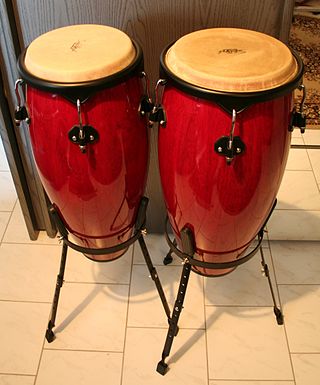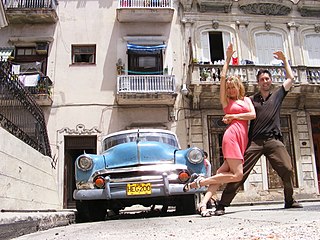Related Research Articles

Salsa music is a style of Caribbean music, combining elements of Cuban, Puerto Rican, and American influences. Because most of the basic musical components predate the labeling of salsa, there have been many controversies regarding its origin. Most songs considered as salsa are primarily based on son montuno and son Cubano, with elements of cha-cha-chá, bolero, rumba, mambo, jazz, R&B, rock, bomba, and plena. All of these elements are adapted to fit the basic Son montuno template when performed within the context of salsa.
The term rumba may refer to a variety of unrelated music styles. Originally, "rumba" was used as a synonym for "party" in northern Cuba, and by the late 19th century it was used to denote the complex of secular music styles known as Cuban rumba. Since the early 20th century the term has been used in different countries to refer to distinct styles of music and dance, most of which are only tangentially related to the original Cuban rumba, if at all. The vague etymological origin of the term rumba, as well as its interchangeable use with guaracha in settings such as bufo theatre, is largely responsible for such worldwide polysemy of the term. In addition, "rumba" was the primary marketing term for Cuban music in North America, as well as West and Central Africa, during much of the 20th century, before the rise of mambo, pachanga and salsa.

Celia Caridad Cruz Alfonso, known as Celia Cruz, was a Cuban singer and one of the most popular Latin artists of the 20th century. Cruz rose to fame in Cuba during the 1950s as a singer of guarachas, earning the nickname "La Guarachera de Cuba". In the following decades, she became known internationally as the "Queen of Salsa" due to her contributions to Latin music. She had sold over 10 million records, making her one of the best-selling Latin music artists.

Salsa is the name for Latin American dances that are danced to salsa music. Salsa is one of the most popular types of Latin dance that is practiced worldwide, and is typically danced with a partner, although there are elements of solo footwork as well. There are several distinct styles of salsa that are danced around the world.

Bartolomé Maximiliano Moré Gutiérrez, better known as Benny Moré, was a Cuban singer, bandleader and songwriter. Due to his fluid tenor voice and his great expressivity, he was known variously as "El Bárbaro del Ritmo" and "El Sonero Mayor". Moré was a master of the soneo – the art of vocal improvisation in son cubano – and many of his tunes developed this way. He often took part in controversias with other singers, including Cheo Marquetti and Joseíto Fernández. Apart from son cubano, Moré was a popular singer of guarachas, cha cha cha, mambo, son montuno, and boleros.

Buena Vista Social Club was a musical ensemble primarily made up of Cuban musicians, formed in 1996. The project was organized by World Circuit executive Nick Gold, produced by American guitarist Ry Cooder and directed by Juan de Marcos González. They named the group after the members' club of the same name in the Buenavista quarter of Havana, a popular music venue in the 1940s. To showcase the popular styles of the time, such as son, bolero and danzón, they recruited a dozen veteran musicians, some of whom had been retired for many years.
Son cubano is a genre of music and dance that originated in the highlands of eastern Cuba during the late 19th century. It is a syncretic genre that blends elements of Spanish and African origin. Among its fundamental Hispanic components are the vocal style, lyrical metre and the primacy of the tres, derived from the Spanish guitar. On the other hand, its characteristic clave rhythm, call and response structure and percussion section are all rooted in traditions of Bantu origin.

Timba is a Cuban genre of music based on Cuban son with salsa, American Funk/R&B and the strong influence of Afro-Cuban folkloric music. Timba rhythm sections differ from their salsa counterparts, because timba emphasizes the bass drum, which is not used in salsa bands. Timba and salsa use the same tempo range and they both use the standard conga marcha. Almost all timba bands have a trap drummer. Timbas also often break the basic tenets of arranging the music in-clave. Timba is considered to be a highly aggressive type of music, with rhythm and "swing" taking precedence over melody and lyricism. Associated with timba is a radically sexual and provocative dance style known as despelote. It is a dynamic evolution of salsa, full of improvisation and Afro Cuban heritage, based on son, Rumba and mambo, taking inspiration from Latin jazz, and is highly percussive with complex sections. Timba is more flexible than salsa and includes a more diverse range of styles. Timba incorporates heavy percussion and rhythms which originally came from the barrios of Cuba.
Guillermo Álvarez Guedes was a Cuban comedian, actor, writer & businessman. He was better known across Latin America as Álvarez Guedes.

Ramón "Mongo" Santamaría Rodríguez was a Cuban percussionist and bandleader who spent most of his career in the United States. Primarily a conga drummer, Santamaría was a leading figure in the pachanga and boogaloo dance crazes of the 1960s. His biggest hit was his rendition of Herbie Hancock's "Watermelon Man", which was inducted into the Grammy Hall of Fame in 1998. From the 1970s, he recorded mainly salsa and Latin jazz, before retiring in the late 1990s.

Frank Grillo known professionally as Machito, was a Latin jazz musician who helped refine Afro-Cuban jazz and create both Cubop and salsa music. He was raised in Havana with his sister, singer Graciela.

Israel López Valdés, better known as Cachao, was a Cuban double bassist and composer. Cachao is widely known as the co-creator of the mambo and a master of the descarga. Throughout his career he also performed and recorded in a variety of music styles ranging from classical music to salsa. An exile in the United States since the 1960s, he only achieved international fame following a career revival in the 1990s.
Arturo "Chico" O'Farrill was a Cuban composer, arranger, and conductor, best known for his work in the Latin idiom, specifically Afro-Cuban jazz or "Cubop", although he also composed traditional jazz pieces and even symphonic works.
Jorge Moreno is a Cuban-American musician and entrepreneur whose career has ranged from winner of the 2002 Latin Grammy Award for Best New Artist, 2003 Grammy Nominee for Best Latin Pop Album to television executive producer, restaurateur and boutique hotelier.]

The Hotel Habana Riviera by Iberostar, originally known as the Havana Riviera, is a historic resort hotel located on the Malecón waterfront boulevard in the Vedado district of Havana, Cuba. The hotel, which is managed by the Spanish Iberostar chain, was built in 1957 and still maintains its original 1950s style. It has twenty-one floors containing 352 rooms all of which feature views of the water and the Vedado neighborhood.
La Palabra is an American bandleader, singer-songwriter, pianist, record producer, and arranger, known for his versatile approach to music, particularly his invention of the Salsa romantica Latin music genre and his signature style of Afro-Cuban-influenced, sensual Latin jazz.
Manuel "Manolín" González Hernández, is a Cuban timba and salsa songwriter, singer, and band leader. Manolín was an amateur songwriter, when NG La Banda's leader José Luis "El Tosco" Cortés discovered him at medical school and famously dubbed him "El Médico de la Salsa".
Cecilia Noël is a Peruvian-born Latin music artist, whose work, with her band, The Wild Clams, combines salsa, soul, jazz, funk, and Afro-Cuban traditions. At one time, she was dubbed the Latin Tina Turner. Noël is married to Men at Work singer Colin Hay, with whom she has frequently recorded and toured.
Paquito Hechavarría was a Cuban pianist. Hechavarría built his career in Cuba by playing in some of the most popular orchestras, including Conjunto Casino, Orquesta Riverside and Los Armónicos. However, he is primarily known for his later work with Miami Sound Machine, the band that catapulted Gloria Estefan to international stardom. He has collaborated with popular artists such as David Byrne, Santana and Christina Aguilera.

Aymée Regla Nuviola Suárez is a Cuban singer, pianist, composer and actress, nicknamed "La Sonera del Mundo". She is also known for having played Celia Cruz in the Colombian telenovela Celia.
References
- ↑ "Alonso Brito left Cuba, but it never left him". Los Angeles Times. 10 August 2008. Retrieved 7 October 2008.
- ↑ "With 57 years of anonymity leaves Alonso Brito". NewsOK. 28 July 2008. Archived from the original on 8 December 2019. Retrieved 7 October 2008.